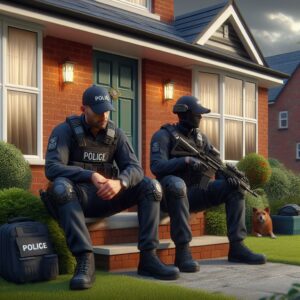How to get Firearm Back from Police
Recovering personal property, particularly firearms, from law enforcement agencies can often feel like an uphill battle. This detailed guide offers insight into the procedures to follow and the legal ramifications to consider when seeking to reclaim firearms seized by the police.
Understanding Why Firearms Are Seized
Police can confiscate firearms for several reasons, ranging from involvement in a crime, unlawful possession, to being a threat to oneself or others. Also, firearms can be seized during an investigation and retained as evidence.
In some cases, the firearm may be held until the owner can prove they possess it lawfully or until the owner complies with conditions set forth by the police or courts (like completion of a domestic violence program, or mental health evaluation).
Request for the Return of the Firearm
Once your firearm has been seized, the first step towards getting it back is to submit a formal request for its return. The request should be made in writing and sent to the law enforcement agency that confiscated the firearm. The letter should include your personal information (name, address, contact details), details about the firearm (type, serial number), and the circumstances under which it was confiscated.
Depending on your jurisdiction, there might be specific forms to fill or procedures to follow when making this request. Ensure you understand and follow these requirements to avoid unnecessary delays or rejections.
Legal Representation
It is highly recommended to seek legal representation in this process, particularly in cases where the seizure was due to criminal activity or where the firearm is being held as evidence. A lawyer will guide you through the legal intricacies and represent your best interests, helping to speed up the process and increase your chances of success.
Court Proceedings
In some situations, you may have to go through court proceedings to recover your seized firearm. For example, if the police decline to return the weapon, or if there are criminal charges tied to the firearm’s seizure, a court hearing may be necessary.
During such proceedings, the court will review the circumstances of the firearm’s seizure and the owner’s eligibility to possess the firearm. It will consider factors such as the owner’s criminal history, mental health status, and whether the owner poses a risk to themselves or the public.
The court will then decide whether to return the firearm or order its disposal. If the court rules in your favor, the judge will issue an order directing the police to return the firearm to you.
Background Check and Waiting Period
Even after you’ve gone through the necessary legal processes, it’s not yet time to celebrate. You must pass a background check to ensure you are legally allowed to possess a firearm.
This step is crucial and ensures that individuals who are prohibited by law from owning guns (such as convicted felons, individuals with restraining orders, or those with specific mental health issues) do not regain possession.
After the background check, there may be a mandatory waiting period before you can collect your firearm. This waiting period varies by state.
Collection of the Firearm
Once you have successfully navigated the above steps, you can collect your firearm. Ensure to bring proper identification and the necessary paperwork, such as a copy of the court order or your request letter.
Remember, the firearm will only be released to the owner, so you must collect it in person. In some cases, the law enforcement agency may require that the firearm is transported unloaded and in a locked container.
Conclusion
The process of reclaiming a seized firearm can be complex and lengthy, requiring both patience and persistence. The legal landscape around firearms is ever-evolving, and local laws and regulations must be thoroughly understood and adhered to. It’s advisable to seek the services of a lawyer experienced in firearm law to help you through this process.
Never forget that while the right to bear arms is constitutionally protected, it’s coupled with the responsibility to ensure those arms are used safely and lawfully. If you’re going through this process, take it as an opportunity to reaffirm your understanding of gun laws and safe handling practices.
This knowledge isn’t just crucial for retrieving your property—it’s fundamental to being a responsible firearm owner.
FAQ
Q: How long does it take to get my firearm back from the police?
A: The time frame varies depending on the circumstances, but typically it can take anywhere from a few weeks to several months. Complex cases involving criminal charges may take even longer. Patience and persistence are key.
Q: What if I can’t afford a lawyer to help with this process?
A: There are legal aid organizations that provide free or low-cost legal services to qualifying individuals. Research options in your state or consult your local public defender’s office.
Q: Can someone else retrieve my firearm for me?
A: No, firearms can only be released directly to the registered owner once all legal requirements are met. The owner must retrieve the weapon in person.
Q: What if my firearm was destroyed as evidence?
A: If your firearm was destroyed as part of an investigation or court order, you will not be able to recover it. However, you may be entitled to compensation for your loss in some cases. Consult an attorney regarding options.
Q: I have a prior conviction – can I still get my firearm back?
A: It depends on the type of conviction, as well as state laws regarding firearm ownership by convicted felons. An experienced lawyer can review your specific circumstances and provide guidance. Don’t attempt to retrieve a firearm if legally prohibited from owning one.







